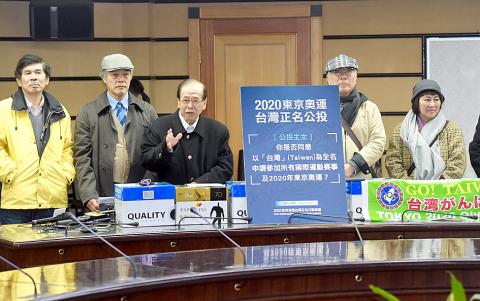Pro-independence groups yesterday submitted a referendum petition to the Central Election Commission to change the nation’s name from “Chinese Taipei” to “Taiwan” at the 2020 Tokyo Olympics.
The name rectification campaign was led by pro-independence advocates, as well as former athletes and sports officials, including track and field Olympic medalist Chi Cheng (紀政) and former Sports Administration director-general Yang Chung-ho (楊忠和).
A total of 4,488 signatures were submitted to the commission.

Photo: Huang Yao-cheng, Taipei Times
The groups last month renewed their referendum drive and collected thousands of signatures within a few weeks following the passage in December last year of amendments to the Referendum Act (公民投票法), which lowered the legal voting age and slashed thresholds for initiating, seconding and passing referendums.
Independence advocates have promoted the campaign for more than a year following an initiative led by the Tokyo-based Taiwan 2020 Campaign Council, which collected signatures from Japanese citizens to petition the government to allow Taiwan’s national team to join the Tokyo Olympics under the name “Taiwan.”
The referendum drive is hoped to make this year “the first year of Taiwanese sports” by allowing the nation’s athletes to join international competitions under an appropriate name, Lee Teng-hui Association for Democracy standing director Chang Tsan-hung (張燦鍙) said.
“Name rectification is in line with the Olympic spirit. Taiwanese athletes after World War II participated in the Olympics under the name Taiwan, so the referendum proposal is legitimate in both theory and practice,” Chang said.
Chang also criticized the commission for the delay in launching an electronic signature collection mechanism, the lack of which has inconvenienced Taiwanese who wish to exercise their rights.
Yang displayed a petition signed by Chi, who at a news conference on Jan. 15 endorsed the name change initiative and called on the International Olympic Committee (IOC) to allow the Taiwanese delegation to participate in the Games under the name “Taiwan.”
Taiwan has competed in the Olympics several times using other names, including “Formosa” at the 1956 Melbourne Olympics; “Taiwan” in 1960, 1964 and 1968; and the “Republic of China” in the 1972 Munich Games, Yang said.
The IOC asked Taiwan to participate in 1976 under the name “Taiwan,” but the Chinese Nationalist Party (KMT) government decided to boycott the Games.
The name “Chinese Taipei” has been adopted since the 1984 Winter Olympics in Sarajevo.
The commission is to verify the petition and referendum topic, and if approval is given, campaigners must collect more than 280,000 signatures to officially launch a referendum.

CHAOS: Iranians took to the streets playing celebratory music after reports of Khamenei’s death on Saturday, while mourners also gathered in Tehran yesterday Iranian Supreme Leader Ayatollah Ali Khamenei was killed in a major attack on Iran launched by Israel and the US, throwing the future of the Islamic republic into doubt and raising the risk of regional instability. Iranian state television and the state-run IRNA news agency announced the 86-year-old’s death early yesterday. US President Donald Trump said it gave Iranians their “greatest chance” to “take back” their country. The announcements came after a joint US and Israeli aerial bombardment that targeted Iranian military and governmental sites. Trump said the “heavy and pinpoint bombing” would continue through the week or as long

TRUST: The KMT said it respected the US’ timing and considerations, and hoped it would continue to honor its commitments to helping Taiwan bolster its defenses and deterrence US President Donald Trump is delaying a multibillion-dollar arms sale to Taiwan to ensure his visit to Beijing is successful, a New York Times report said. The weapons sales package has stalled in the US Department of State, the report said, citing US officials it did not identify. The White House has told agencies not to push forward ahead of Trump’s meeting with Chinese President Xi Jinping (習近平), it said. The two last month held a phone call to discuss trade and geopolitical flashpoints ahead of the summit. Xi raised the Taiwan issue and urged the US to handle arms sales to

State-run CPC Corp, Taiwan (CPC, 台灣中油) yesterday said that it had confirmed on Saturday night with its liquefied natural gas (LNG) and crude oil suppliers that shipments are proceeding as scheduled and that domestic supplies remain unaffected. The CPC yesterday announced the gasoline and diesel prices will rise by NT$0.2 and NT$0.4 per liter, respectively, starting Monday, citing Middle East tensions and blizzards in the eastern United States. CPC also iterated it has been reducing the proportion of crude oil imports from the Middle East and diversifying its supply sources in the past few years in response to geopolitical risks, expanding

Pro-democracy media tycoon Jimmy Lai’s (黎智英) fraud conviction and prison sentence were yesterday overturned by a Hong Kong court, in a surprise legal decision that comes soon after Lai was jailed for 20 years on a separate national security charge. Judges Jeremy Poon (潘兆初), Anthea Pang (彭寶琴) and Derek Pang (彭偉昌) said in the judgement that they allowed the appeal from Lai, and another defendant in the case, to proceed, as a lower court judge had “erred.” “The Court of Appeal gave them leave to appeal against their conviction, allowed their appeals, quashed the convictions and set aside the sentences,” the judges